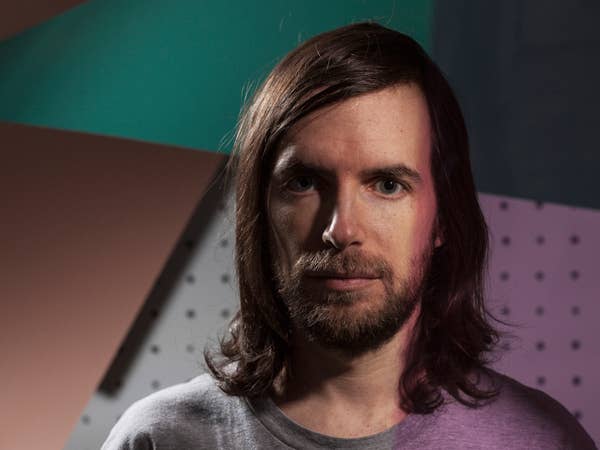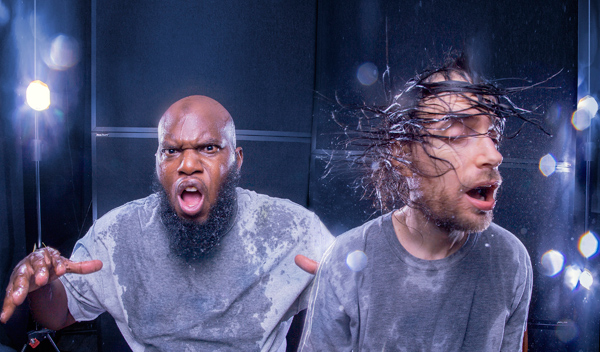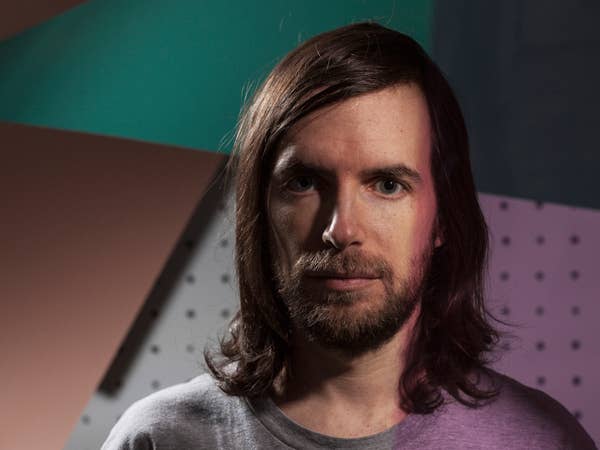1.

Photo by Paul Sobota
I still remember the first time I heard Girl Talk’s 2006 album Night Ripper. I bought the CD not knowing what it was—a friend had mentioned it in passing and when I saw it in the record store, I was drawn in by the cover. The first time I played it, I was with some friends in the basement of a townhouse in Virginia, and it blew my mind. Biggie over Elton John? What the fuck was this?
Girl Talk didn’t invent mash-ups, but for many, he revolutionized the art form for modern times, achieving effects that ranged from jarring to beautiful to hilarious.
In the following years, mash-up culture became a new beast. Artists who specialized in the mash-up went semi-viral every time they struck gold and hit that magic combination. Some—like The Hood Internet, Brenton Duvall, and The Jane Doze—built up a big enough following to kick off a career that included live shows, merch, and the opportunity to expand into other areas like remixes and original productions.
But with increasingly strict laws that seek to reduce copyright infringement, the music industry has pushed mash-up artists back to the fringes. One pops up every now and then with a big hit, but their impact is no more than that of a fleeting meme. It never really matters who did the mash-up, just that it exists. These mash-ups surface on the internet, get covered by a few blogs and websites if they’re lucky, rack up some impressive numbers, and then disappear into obscurity.
So where do mash-ups fit in the industry today? Is the art of the mash-up a thing of the past? We spoke to Girl Talk to get his take on the state of mash-ups and where things may go from here.
I know you’ve said before that you don’t really like to be associated with mash-ups. Can you elaborate on that?
I don’t see it as a bad thing. I think my level of influence when I started doing this didn’t specifically come from a mash-up place, but I really got into this around 2000. There was a lot of sample-based music that wasn’t necessarily classified as mash-ups, and that ranged from pretty much every hip-hop release in the early ’90s to more electronic music. I always came at it from that perspective. There’s definitely a mash-up component to what I do, so I don’t think that’s a mislabel for anyone to call me a mash-up artist. I feel like it’s fitting, but I always wanted to do something different with it.
In the world of sample-based music or in mash-ups, there’s a ton of interesting stuff out there, and often times there can be a negative stigma attached to mash-ups just because the potential novelty of it. I think even the stuff that’s very comedic or novelty-based has its place, and it can be amazing in its own way. There are different scenes within it, and I’ve always felt more connected to the greater role of sample-based music. It’s always going on with people doing remixes, and that’s existed forever, but within the past 10 years that’s exploded.
With that being said, I don’t really mind being associated with mash-ups, but I think there are different intentions within that world, and sometimes labeling someone as that might not give the total picture of what they’re going for in their art.
One of the reasons we’re doing this is because we’ve noticed that since you started releasing music, there’s been this whole wave of producers making sample-based music, and a lot of them strictly do mash-ups where they take two songs and put them together and release it on Soundcloud. Lately, we’ve been seeing that SoundCloud has been tightening up and taking down a lot of these producers, and it seems like this whole culture is disappearing. Do you see that at all?
To be honest I don’t check specifically for mash-ups. I don’t keep up with the scene so much, and that’s not a diss towards it. I think there’s tons of amazing stuff within it. That’s something I don’t necessarily keep tabs on thoroughly, but I will say just from my personal Facebook feed or Twitter, I do think the idea of unsolicited remixes is still booming.
Whether that is technically a mash-up or just someone doing an original composition, I think that’s something that continually grows. Because any pop song that comes out gets a million remixes and is constantly worked over. That’s just the standard now, and you assume that’s going to happen. As far as the availability or the number of mash-ups out there, I don’t necessarily know, but I think the amount of remixes is something that’s booming and to me they are very related, kind of like cousins in music.
Maybe a lot of people were dabbling, and people who were interested in doing a mash-up five or six years ago might be doing a trap remix now. It doesn’t have to be a specific genre of music. It’s just reworking music, and that hasn’t faded out. Things kind of come and go in waves, and even when I put out Night Ripper in 2006 I felt that mash-ups were dying down, and that’s why I felt comfortable exploring it. It was really booming in the early 2000s and it kind of died down, and then Night Ripper came and it picked up at that point again, and more people seemed interested in that sort of thing. I think it just comes in waves.
Because any pop song that comes out gets a million remixes and is constantly worked over. That’s just the standard now, and you assume that’s going to happen.
You felt that mash-ups were dying down around the time of Night Ripper. Where did that scene exist? I only know mash-ups from the internet and SoundCloud. Where did that stuff live before?
I think it was always the internet. Napster really helped with something like that, because there were tapes and DJ mixes and stuff that was basically proto mash-ups were always there. People were blending stuff from the ’80s and ’90s, like a capella and instrumentals. That always existed there, and I think that gets glossed over sometimes when people put things in a historical context. People don’t connect that, but that absolutely set the foundation for what anyone would call a mash-up.
How you frame it makes a big difference. It is putting two songs together and presenting it as a new song. I think that’s a big deal conceptually, whereas I think some DJ mixes or blends and things like that might not be presented in that way. It might be part of a bigger picture, or considered a remix. It might just be functional, for the dancefloor or the club, as opposed to its own song you would listen to.
After that, the first real mash-ups that I heard were in the mid-to-late ’90s, from The Evolution Control Committee. He had a couple of things that would sometimes get on college radio, and he had these mixes with Public Enemy a capellas over Herb Alpert instrumentals. So technically, the earliest mash-up stuff I heard was through college radio, and then on cassette. Right after that was Freelance Hellraiser, Girls On Top, and 2manydjs.
I think that scene was successful in the first boom because of Napster and file sharing, because that was the first time you could make something in your bedroom and put it out there for other people to hear. There were a couple of websites dedicated to it back then. I remember there being a site called Boomkat or something. I’m probably getting that wrong, but there were a few hubs during that time, and I would hear it at parties sometimes.
Streaming services are owned by big companies, and now it is actually more difficult to hear someone’s DIY project, especially if it is in a grey area with copyright. But that could also foster some underground camaraderie.
What do you think the impact of music streaming is going to have on sample-based music, specifically with mash-ups? It feels like Apple, Tidal, and Spotify are all dominating now, and they are all big corporations that are strict about copyright laws.
I think that could be spun to force someone underground. Streaming services are owned by big companies, and now it is actually more difficult to hear someone’s DIY project, especially if it is in a grey area with copyright. But that could also foster some underground camaraderie.
Even with my own projects, when I was putting out an actual CD with music in a grey area, copyright is a risk. You have to have somebody who wants to invest money to do that. To get there it takes a lot of effort and commitment to what you’re doing, and I think that results in interesting things as opposed to just putting anything on the internet and throwing it out there in a way where it doesn’t matter what happens to it. I do think that having issues with getting things out there and needing to commit to something can result in interesting music and art because of those issues and difficulties.
5.

Photo by Andrew Strasser
Has this affected you at all with your plans for the future? I know you did that project with Freeway. Are you feeling pressure to avoid breaking the law, like more pressure to clear samples and do everything by the books?
I don’t really think about it. I would say that my decision to not release a solo album since 2010 has really nothing to do with the state of things with streaming. It was more of a creative decision, like doing the Freeway thing. I was steady touring, but in the past two or three years I’ve cut back a bit, and I’ve had time to make music that doesn’t necessarily have to work at a live show.
It’s kind of liberating to work on whatever I want to work on, and that’s what resulted in the Freeway thing. I want to do more projects like that, but that’s not related to streaming music, the state of copyright, or anything like that. I do stay very busy making mash-up related stuff for shows, and I still feel I wouldn’t do that unless I thought it was interesting and I thought I was moving forward. I never want to get stagnant with it. I would rather just stop doing it than do the same thing.
With each of my albums over the years, I want to make a distinctive jump stylistically, or have something different conceptually from album to album. I still feel that way with the live material. I want to keep it moving. Even though I haven’t put out an album, I spend a lot of time and energy developing that material specifically for shows.
Rock music may not be as popping as it was 20 years ago, but you can still make interesting rock music, and there are still people with guitars doing interesting things.
Do you think that mash-ups have a place in music in the future? Do you think it’s going to be a genre or an art form that sticks around?
I think it’s going to splinter. I think elements of it will be around, and I think elements of it were around much before people were using the term “mash-up,” and I think it will stick around until after that term fades. I think it’s the idea of combining elements.
A few years ago when EDM was beginning to explode, young people were so set on that being a thing. Back then, people couldn’t wrap their heads around mash-up sets at festivals, because it was so different sonically than what EDM or dubstep was. As time has gone on, EDM has become commercialized, and what I like to do is take pieces of pop culture and do something that is alternative—something that doesn’t fit into that world—and something that is a bit weird. Doing something mash-up related in 2015 is that, and I feel proud and confident that the music I’m presenting is different than what other people are doing.
Mash-ups can evolve as other music evolves, taking pieces and elements from EDM or any modern pop and keeping it current and forward-thinking. I think people making mash-ups can go on for a long time as long as it isn’t stagnant. That’s something I always strive to do.
Mash-ups can evolve as other music evolves, taking pieces and elements from EDM or any modern pop and keeping it current and forward-thinking. I think people making mash-ups can go on for a long time as long as it isn’t stagnant.
Any other thoughts on where mash-up culture is going, or specifically how it’s changing?
I feel like elements of it are going to continue to evolve. To me, the bigger thing is that whole remix culture. Even if mash-ups may be dying down now, I think that remixes are not going to stop. There’s access to music software and there’s so many more young people interested in DJing and doing electronic music.
When a new Migos song comes out, everyone has a remix of it. It’s an interesting thing for me, because I don’t personally know a lot of people on my Facebook page. They just reached out because they knew my name eight years ago, so they were Girl Talk fans from back then. I see a lot of the people posting music they made, or see them playing shows. When I scroll through my feed of strangers that I don’t know, so many of those people are doing remix-related stuff.
Doing a mash-up right now isn’t as trendy as it was. I dont think it necessarily means you can’t work within a certain art form to do something interesting with it. Rock music may not be as popping as it was 20 years ago, but you can still make interesting rock music, and there are still people with guitars doing interesting things. I’ve always felt like an outsider at every point doing this, and I think it’s fun to be an outsider. I think in electronic music, especially for a lot of DJs and producers, I don’t even think they think of themselves as artists. It’s more of like a functional job.
Whatever is popping at this moment is what they are going to be dealing with, and that’s what they’re going to playing, and that’s what they’re going to be making. That’s cool. It’s kind of selfless that way, but I’ve always treated my projects more like a traditional band where I have a specific sound decision and I want to work within that and no matter what is happening in terms of popularity, I would rather be outside doing my own thing. Even in 2008, mash-ups weren’t in the clubs or in the mainstream. You would hear elements of it, but it was still always an alternative. In that way I feel like it’s a healthy place to be, something that’s a bit different from what everyone is doing.
Girl Talk and Freeway’s Broken Ankles EP is out now.


